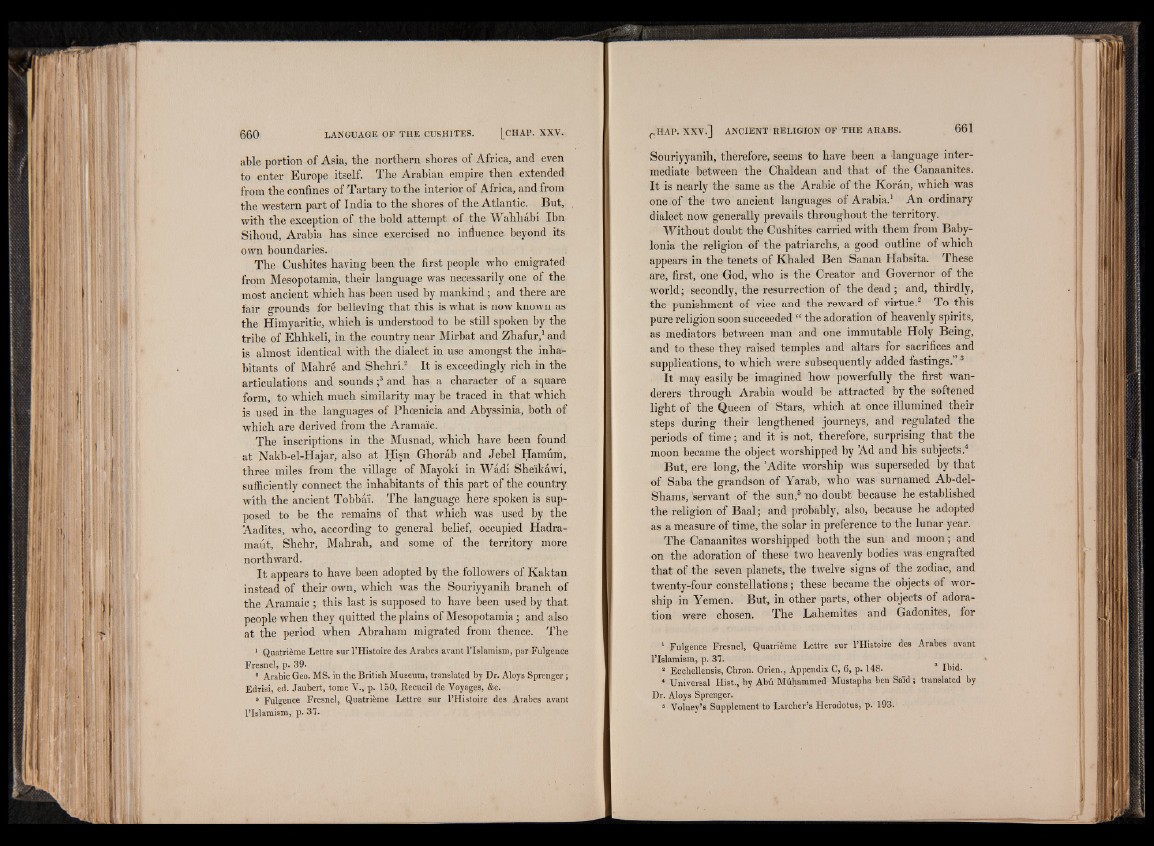
able portion of Asia, tbe northern shores of Africa, and even
to enter Europe itself. The Arabian empire then extended
from the confines of Tartary to the interior of Africa, and from
the western part of India to the shores of the Atlantic. But,
with the exception of the bold attempt of the Wahhabi Ibn
Sihoud, Arabia has since exercised no influence beyond its
own boundaries.
The Cushites having been the first people who emigrated
from Mesopotamia, their language was necessarily one of the
most ancient which has been used by mankind ; and there are
fair grounds for believing that this is what is now known as
the Himyaritic, which is understood to be still spoken by the
tribe of Ehhkeli, in the country near Mirbat and Zhafur,1 and
is almost identical with the dialect in use amongst the inhabitants
of Mahré and Shehri.2 It is exceedingly rich in the
articulations and sounds ;3 and has a character of a square
form, to which much similarity may be traced in that which
is used in the languages of Phoenicia and Abyssinia, both of
which are derived from the Aramaic.
The inscriptions in the Musnad, which have been found
at Nakb-el-Hajar, also at Hisn Ghorâb and Jebel Hamum,
three miles from the village of Mayoki in Wâdi Sheikawi,
sufficiently connect the inhabitants of this part of the country
with the ancient Tobbai. The language here spoken is supposed
to be the remains of that which was used by the
Aadites, who, according to general belief, occupied Hadra-
maut, Shehr, Mahrah, and some of the territory more
northward.
It appears to have been adopted by the followers of Kaktan
instead of their own, which was the Souriyyanih branch of
the Aramaic ; this last is supposed to have been used by that
people when they quitted the plains of Mesopotamia ; and also
at the period when Abraham migrated from thence. The
1 Quatrième Lettre sur l’Histoire des Arabes avant l’Islamism, par Fulgence
Fresnel, p. 39-
1 Arabie Geo. MS. in the British Museum, translated by Dr. Aloys Sprenger ;
Edrisi, ed. Jaubert, tome V., p. 150, Recueil de Voyages, &c.
3 Fulgence Fresnel, Quatrième Lettre sur l ’Histoire des Arabes avant
l’Islamism, p. 37.
Souriyyanih, therefore, seems to have been a language intermediate
between the Chaldean and that of the Canaanites.
It is nearly the same as the Arabic of the Koran, which was
one of the two ancient languages of Arabia.1 An ordinary
dialect now generally prevails throughout the territory.
Without doubt the Cushites carried with them from Babylonia
the religion of the patriarchs, a good outline of which
appears in the tenets of Khaled Ben Sanan Habsita. These
are, first, one God, who is the Creator and Governor of the
world; secondly, the resurrection of the dead ; and, thirdly,
the punishment of vice and the reward of virtue.2 To this
pure religion soon succeeded “ the adoration of heavenly spirits,
as mediators between man and one immutable Holy Being,
and to these they raised temples and altars for sacrifices and
supplications, to which were subsequently added fastings. 3
It may easily be imagined how powerfully the first wanderers
through Arabia would be attracted by the softened
light of the Queen of Stars, which at once illumined their
steps during their lengthened journeys, and regulated the
periods of time ; and it is not, therefore, surprising that tbe
moon became the object worshipped by Ad and his subjects.4
But, ere long, the ’Adite worship was superseded by that
of Saba the grandson of Yarab, who was surnamed Ab-del-
Shams, 'servant of the sun,6 no doubt because he established
the religion of Baal; and probably, also, because he adopted
as a measure of time, the solar in preference to the lunar year.
The Canaanites worshipped both the sun and moon ; and
on the adoration of these two heavenly bodies was engrafted
that of the seven planets, the twelve signs of the zodiac, and
twenty-four constellations ; these became the objects of worship
in Yemen. But, in other parts, other objects of adoration
were chosen. The Lahemites and Gadonites, for
1 Fulgence Fresnel, Quatrième Lettre sur l ’Histoire des Arabes avant
l’Islainism, p. 37.
* Ecchellensis, Chron. Orien., Appendix C, 6, p. 148. 3 Ibid.
* Universal Hist., by Abii Miihammed Mustapha ben Said ; translated by
Dr. Aloys Sprenger.
5 Volney’s Supplement to Larcher’s Herodotus, p. 193.